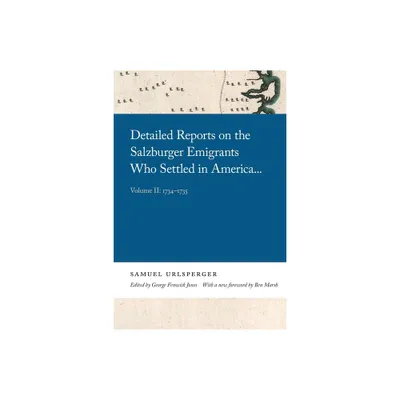Home
Detailed Reports on the Salzburger Emigrants Who Settled in America . . .: Volume V: 1738
Loading Inventory...
Barnes and Noble
Detailed Reports on the Salzburger Emigrants Who Settled in America . . .: Volume V: 1738
Current price: $34.95


Barnes and Noble
Detailed Reports on the Salzburger Emigrants Who Settled in America . . .: Volume V: 1738
Current price: $34.95
Loading Inventory...
Size: OS
*Product Information may vary - to confirm product availability, pricing, and additional information please contact Barnes and Noble
The eighteen volumes of
Detailed Reports on the Salzburger Emigrants Who Settled in America
(reproduced in sixteen discrete books) contain the diaries and letters of Lutheran pastors who ministered to the Salzburgers, German-speaking Protestant refugees, in Georgia. Samuel Urlsperger collected and edited these writings into the
Urlsperger Reports
printed at Orphanage Press, Halle, Germany, from 1735 to 1760. The original German publication,
Ausführliche Nachricht von den saltzburgischen Emigranten,
is available through the Internet Archive, but this English-language translation has not been available online until now.
In the mid-eighteenth century, Samuel Urlsperger of the Lutheran Ministry in Augsburg edited the German edition of the
Detailed Reports
after having distributed the many reports to the faithful in Germany. He made major deletions for both diplomatic and economic reasons and suppressed proper names. His son, Johann August Urlsperger, succeeded him. He took even greater liberties with the text, deleting large sections and rearranging others. The English version, translated and edited by George Fenwick Jones, a German scholar, restores the deleted sections and the proper names and provides the original sequencing of the material.
The
offer insight into daily life in colonial Georgia and provide precious details and vignettes on subjects that receive less attention in other sources, notably African Americans, women, silk production, and the cost of goods in a frontier colony. The
Reports
are an underutilized resource for the study of this period and an unparalleled source for the evolution of a rural community during the early years of the colony.
The Georgia Open History Library has been made possible in part by a major grant from the National Endowment for the Humanities: Democracy demands wisdom. Any views, findings, conclusions, or recommendations expressed in this collection, do not necessarily represent those of the National Endowment for the Humanities.
Detailed Reports on the Salzburger Emigrants Who Settled in America
(reproduced in sixteen discrete books) contain the diaries and letters of Lutheran pastors who ministered to the Salzburgers, German-speaking Protestant refugees, in Georgia. Samuel Urlsperger collected and edited these writings into the
Urlsperger Reports
printed at Orphanage Press, Halle, Germany, from 1735 to 1760. The original German publication,
Ausführliche Nachricht von den saltzburgischen Emigranten,
is available through the Internet Archive, but this English-language translation has not been available online until now.
In the mid-eighteenth century, Samuel Urlsperger of the Lutheran Ministry in Augsburg edited the German edition of the
Detailed Reports
after having distributed the many reports to the faithful in Germany. He made major deletions for both diplomatic and economic reasons and suppressed proper names. His son, Johann August Urlsperger, succeeded him. He took even greater liberties with the text, deleting large sections and rearranging others. The English version, translated and edited by George Fenwick Jones, a German scholar, restores the deleted sections and the proper names and provides the original sequencing of the material.
The
offer insight into daily life in colonial Georgia and provide precious details and vignettes on subjects that receive less attention in other sources, notably African Americans, women, silk production, and the cost of goods in a frontier colony. The
Reports
are an underutilized resource for the study of this period and an unparalleled source for the evolution of a rural community during the early years of the colony.
The Georgia Open History Library has been made possible in part by a major grant from the National Endowment for the Humanities: Democracy demands wisdom. Any views, findings, conclusions, or recommendations expressed in this collection, do not necessarily represent those of the National Endowment for the Humanities.


















